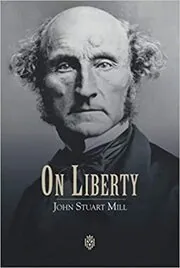On Liberty Summary
Author: John Stuart Mill
This page offers our On Liberty summary (John Stuart Mill's book). It opens with an overview of the book, and follows with a concise chapter-by-chapter summary.
Drafted with AI assistance and reviewed by a human editor.
As an Amazon Associate, we earn from qualifying purchases (at no extra cost to you).
This book has 1 recommender!
Overview
The core focus of this literary piece is the significance of diversity in character and the necessity for unrestricted personal growth in myriad and often contrasting directions. The narrative strongly advocates for individualism and criticizes conformism. It refutes the idea of forced compliance, whether legally or socially, in terms of personal beliefs and actions. The author suggests that control should only be implemented when someone's actions could potentially harm others. Otherwise, the text emphasizes that society should embrace diversity.
The narrative extols the virtues of freedom, demonstrating its benefits on both individuals and the broader society by utilizing a Utilitarian outlook. The text connects freedom to progress and the prevention of social stagnation. Freedom of opinion and action are championed for a number of reasons. Unpopular opinions may be correct and even if they aren't, their contradiction can lead to a stronger understanding of one's own beliefs. Likewise, nonconforming actions can be beneficial, they may lead to a way of life that, while not suited to everyone, is best for the individual. These nonconformists provide a challenge to societal complacency, preventing it from becoming static.
The narrative is structured in five sections. The first offers a concise explanation of freedom and puts forth the basic argument supporting it, provided it does not inflict harm on others. The following two sections delve deeper into the reasons why freedom of opinion and action hold such value. The fourth part examines the suitable extent of societal control over individuals. The final part applies the theory to specific examples, aiming to elucidate the claims made. However, the narrative has faced criticism for being too ambiguous about the boundaries of freedom, overemphasizing the individual, and failing to clearly differentiate between self-harming and harmful-to-others actions. Nonetheless, the text effectively highlights the societal benefits of nonconformity, reminding readers that no one can claim with full certainty that their way of living is the best or only way.
Edited by
Software engineer whose passion for tracking book recommendations from podcasts inspired the creation of MRB.
Lead investor at 3one4 Capital whose startup expertise and love for books helped shaped MRB and its growth.







Comments
Did we miss something? Have feedback?
Help us improve this page by sharing your thoughts